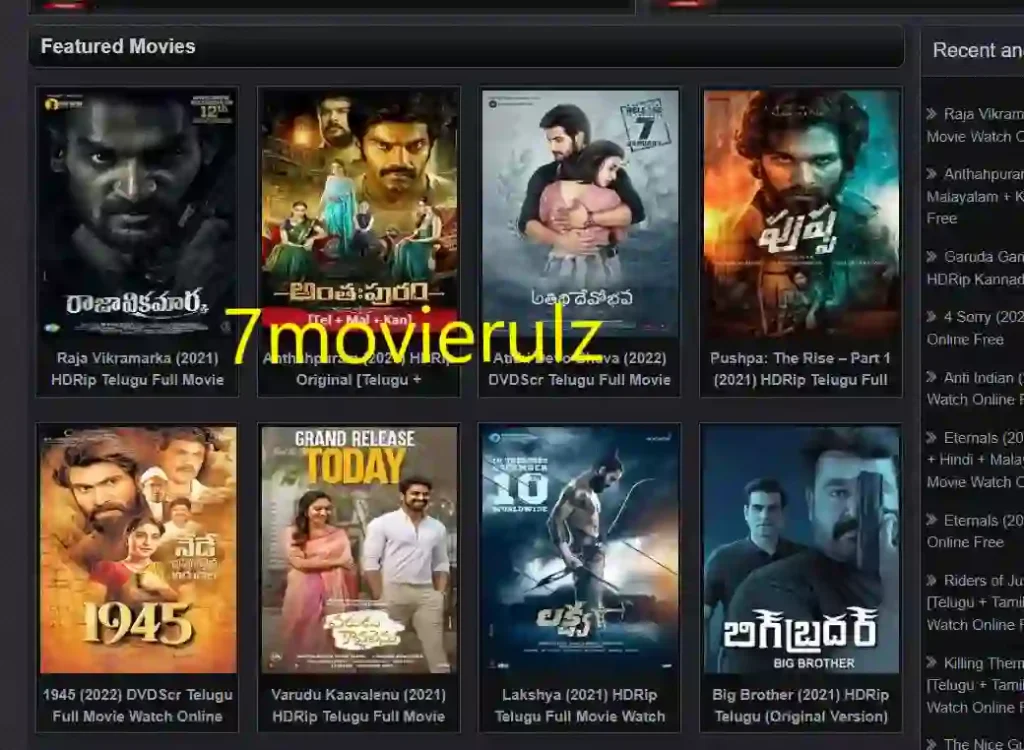Latest On Movierulz: News, Reviews & 2025 Movie Updates!
Is the world of cinema truly expanding, or is it merely fracturing into a multitude of fragmented realities? The digital age has undeniably democratized access to film, yet it has also created a complex ecosystem where authenticity and legality often clash with the allure of instant gratification.
The entertainment landscape, particularly within the vibrant tapestry of South Indian cinema, is undergoing a dramatic evolution. The rise of digital platforms and the increasing global reach of regional cinema are reshaping how audiences consume content. From the bustling streets of Mumbai to the serene backwaters of Kerala, the cinematic experience is no longer confined to traditional theaters. However, this transformation has given rise to various issues that include online piracy and the challenge of maintaining the integrity of the art form. This article delves into the evolving dynamics of film consumption and the role of platforms like Movierulz in this narrative, aiming to dissect the complexities and contradictions that define the current cinematic age.
| Category | Details |
|---|---|
| Name | Movierulz |
| Type | Website |
| Purpose | Provides updates, reviews, and access to movies, TV shows, and web series. |
| Content Focus | Bollywood, Hollywood, South Indian films (Tamil, Telugu, Kannada, Malayalam), TV shows, and Kdramas |
| Key Features | Movie news, trailers, reviews, and potentially links to pirated content. |
| Operating Status | Likely operates via various domains and mirrors to evade takedowns. |
| Associated Risks | Potential for malware, illegal content access, and copyright infringement. |
| Legal Status | Piracy-based platform, which operates in violation of copyright laws. |
| Source | Wikipedia: Copyright Infringement |
The proliferation of websites like Movierulz, which claim to offer the latest Tollywood, Bollywood, and Hollywood movie reviews, news, and trailers, raises a critical question: Are these platforms providing a valuable service, or are they contributing to the erosion of the film industry through copyright infringement? These websites often position themselves as sources of immediate access to content, attracting a vast audience seeking quick updates and, in some cases, unauthorized downloads of movies in various languages, including Tamil, Telugu, Kannada, and Hindi. They also tap into the burgeoning interest in international content, including Kdramas, offering a gateway to global entertainment.
The appeal of such platforms is undeniable. They promise instant access to the latest releases, often in HD quality, catering to the modern consumer's demand for immediate gratification. The offerings extend beyond just movies; they include web series and television shows, encompassing a wide variety of genres and formats. This comprehensive approach creates a one-stop shop for entertainment, which draws in a broad spectrum of users.
However, it is crucial to examine the ethical and legal implications of utilizing such services. Movierulz, and websites like it, are frequently labeled as piracy websites. They often facilitate the illegal distribution of copyrighted material, a practice that severely impacts the financial health of the film industry. This action is not only a violation of copyright laws, but it also undermines the creative efforts of filmmakers, actors, and all the individuals who contribute to the making of a film.
The impact of piracy extends beyond the economic realm. When content is obtained illegally, it can also carry significant risks for users. Pirated content often contains malware or viruses, potentially compromising the security of personal devices and exposing users to malicious attacks. Additionally, the quality of pirated content is often inferior to the original, diminishing the viewing experience and devaluing the art form.
The evolution of South Indian cinema is also heavily impacted by these dynamics. Films from the Tamil, Telugu, Kannada, and Malayalam industries, frequently targeted by piracy, are impacted by the illegal distribution of content. The release of a film like "Akkada Ammayi Ikkadaalappuzha Gymkhana", which premiered in Telugu on April 25, 2025, is a clear example of the intricate relationships that exist between production and consumption. These movies, often very popular in their original languages, can gain or lose popularity as a result of easy accessibility through piracy.
A discussion of the trends and forecasts for 2025 releases in the industry shows how essential it is to understand these dynamics. The prospect of upcoming movies, like "Sinners," "The Accountant 2," "Thunderbolts*," and "Mission:", generates excitement among filmgoers. These eagerly anticipated titles, and many others, form the basis of discussions among movie enthusiasts, who are anticipating the arrival of fresh material from throughout the world.
The role of Movierulz and similar sites, in light of these developments, calls for a more in-depth examination. These websites serve as sources of information, giving moviegoers a look into the world of future releases. They provide information about release dates, trailers, and reviews. Yet, this accessibility frequently comes at a cost; the practice of offering unlawful access to copyrighted materials threatens the sustainability of the sector.
In the ever-changing entertainment environment, understanding these subtleties is critical. The ability to distinguish between legitimate and illegal platforms is crucial for supporting creators and sustaining the development of high-quality content. By putting ethical consumption habits first, moviegoers may promote a thriving film industry and protect the art form for coming generations.
The industry's rapid transformation presents both prospects and obstacles for filmmakers, distributors, and viewers. As technology advances, so does the requirement for responsible content consumption. It is important for the industry to adjust to protect its artistic integrity and financial stability, while providing the public with enjoyable and easily accessible entertainment.
The impact of piracy is far-reaching. It affects the economic vitality of the film industry, as well as the creative endeavors of the people involved. Movie producers, actors, and other creative professionals all depend on fair revenue for their livelihoods. Illegal downloads and streaming not only reduce profits but also remove resources from the creative process, which results in less money for future projects. In the long run, the art of filmmaking may be harmed by this.
Furthermore, the distribution of illegal material poses dangers to users. Pirated content is frequently laced with malware, which exposes viewers to security risks and may violate their privacy. Illegal streaming services can also lead to a decline in content quality, resulting in a subpar viewing experience that depreciates the artistic merit of the original work.
The recent success of "Marco," a Malayalam film that was released on January 1st in Telugu, perfectly illustrates the intricacies of the regional film industry. Whether a film like "Marco" satisfies the Telugu audience will be evaluated based on its promotion and initial release. This instance demonstrates the crucial need to control content distribution and protect the interests of both creators and consumers in the face of digital piracy.
Platforms that give reviews, box office data, and cast insights, like Movierulz, perform a valuable service in the world of cinema. They give viewers the information they need to make educated decisions about their entertainment. Nevertheless, it is critical to strike a balance between offering this type of information and adhering to moral and legal standards.
The industry will have a sustainable future if it can strike this balance. Legal channels, such as authorized streaming services and theaters, are essential for sustaining creativity and encouraging economic growth. By supporting ethical business practices, the film industry can continue to provide excellent entertainment while protecting the rights of all those involved.
The year 2025 represents a critical time for the film industry. In addition to upcoming movie releases, audiences will be watching the development of new technologies and the evolution of viewing behaviors. The sector must change in order to protect its long-term viability. This involves stepping up enforcement measures against piracy, encouraging collaborations between producers and legitimate distributors, and raising public awareness of the significance of ethical consumption.
In conclusion, the discussion of Movierulz, and other websites, brings to light the difficulties that the film business is currently experiencing. The sector is confronted with a complex environment in which access to information and the desire for instant entertainment coexist. The film industry can ensure a prosperous future by tackling issues like piracy, putting ethics first, and encouraging sustainable business practices. The future of cinema depends on our collective efforts to respect creativity, defend intellectual property rights, and support the production of high-quality entertainment for people all around the world.


